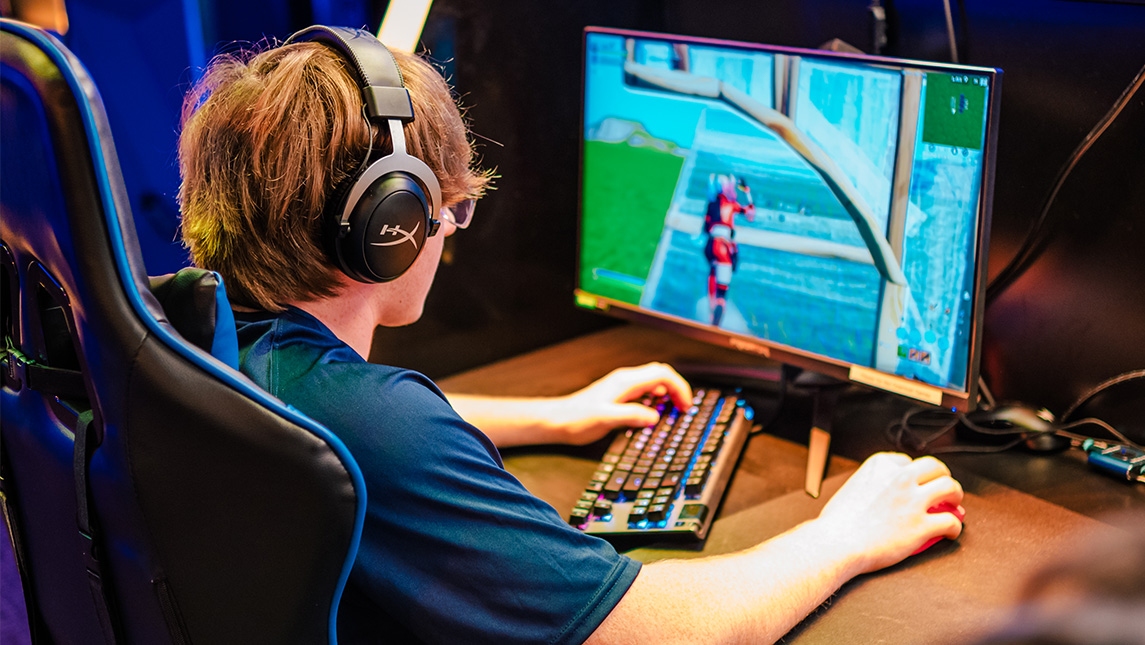As UNC Greensboro hosts Esports tournaments and introduces students to the professional and innovative possibilities connected to video games, faculty aren’t being left out. They can turn to UNCG’s Network for Cultural Study of Videogaming (NCSV) to help kickstart research.
This summer, the NCSV awarded seed grants to ten research proposals to faculty from three of UNCG’s schools and colleges, which they used to build and pursue grants for more extensive research in the areas of psychology, English, religious studies, or any field of expertise they’re comfortable with.

“I wanted to show how broad and interdisciplinary games are,” says Dr. Gregory Grieve, director of NCSV. “The stipulation was only that they have to engage with eSports or games in some way.”
Each proposal would help researchers, teachers, and parents understand the impact of video games on human behavior, cultural and economic growth, and media preservation.
NCSV Associate Director John Borchert, says, “The goal of the grants, and the Network more broadly, is to incubate and elevate the academic pursuits of faculty and students already happening here on campus.”
Press Start with a Library Card
Many libraries make video game discs and cartridges available to check out, but hurdles remain for stocking games that are digital-only. In the meantime, the creation of online platforms such as Steam has led to developers releasing more games online without manufacturing a single physical copy.

Dr. Colin Post, assistant professor of information, libraries, and research science, worked with graduate student Jerry Reed to gather preliminary information from librarians and independent game developers. They can use that to pursue research into a licensing system for people to check out digital games from libraries.
Reed cares deeply about improving access to information. “I’m hoping that, from this research, academic libraries can create a model or system to collect games, be it from a large distributor or individual developers.”
They believe laying this framework first will make companies – which may be protective of the exclusivity of their gaming platforms – more comfortable working with libraries. Post pushes back against fears that it would hurt a game’s sales. He says, “Making things available in libraries gets more people interested in it. That’s been true for eBooks and digital video.”
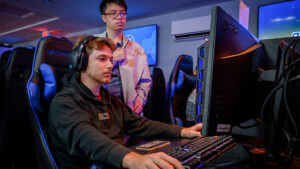
They looked at how libraries already store eBooks and digital films. “If libraries and institutions have a responsibility for preservation as well as access, if we’re not doing this work proactively, there’s not going to be a history of games to point back to,” says Post.
Reed says this will keep what makes video games unique from other media. “With a video game, there’s the element of play. We want to be able to digitally preserve it be played, to let people experience that part of the medium.”
Kids’ Relationship to Tech
Parents frequently wonder how safe technology is for their children. Dr. Michaeline Jensen, professor of psychology, says, “It is not uncommon for parents to ask me, ‘Should I let my eighth grader have a cell phone?’ or, ‘How much video gaming is too much video gaming?’”

Parents may be surprised to hear that, though there are many anecdotes about psychological and physiological harms from long hours playing video games or browsing social media, not a lot of research has been done to back up those claims. Dr. Jessica Dollar, research scientist in UNCG’s Center for Women’s Health and Wellness, explains, “There have been parallel increases in ADHD and technology engagement over the last several years, and so some people say, ‘Technology engagement is at the core of these increases in mental health issues.’ But when you really delve into the science, the links are not always consistent.”
Jensen and Dollar hope to receive a National Institutes of Health grant to examine how children’s technology engagement is associated with their sleep, attention-deficit hyperactivity symptoms, and self-regulation.
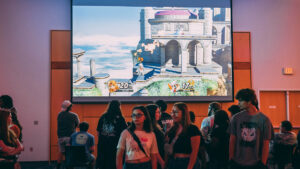
They’d collaborate with Drs. Laurie Wideman, Safrit-Ennis distinguished professor of kinesiology; and Arthur Anastopoulos, professor emeritus of human development and family studies. Together, they’ll collect data using the many lab tools at their disposal, the phones themselves, and daily questionnaires.
“In these questionnaires, the children will tell us how they feel in terms of impulsivity, executive functioning, and emotion regulation, and what their sleep was like,” says Jensen.
Their research might also help parents and healthcare providers appreciate potential benefits of video games and technology, such as the development of motor skills and opportunities for socialization. Dollar says, “If we care about this population, we have to be aware of all the ways they’re interacting, learning, and spending their time. We have to consider video gaming and technology engagement more broadly.”
Gaming Global Perspective
Video games don’t exist in a vacuum. Like other forms of art, they’re influenced by the culture in which they’re made and played. Dr. Rohit Singh, visiting assistant professor of religious studies and director of undergraduate studies, intends to explore the evolution of gaming culture in Southeast Asia.
“As a scholar of religion, I’m very curious about the elements of mythology and ritual that are referenced in these in these games,” Singh says.
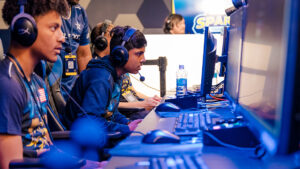
He used his seed grant to apply for a senior fellowship with the American Institute of Indian Studies (AIIS), an organization he’s worked with before. Singh would like to use that position to visit game developers and gaming fans in India and other Asian countries.
India, he says, has reached the point where most households have phones or video game consoles. But before these were easily accessible, gamers would go to cybercafes to play their favorite games. Singh plans to visit those communal gathering spaces.
“There’s often tucked away in those traditional bazaars one or two little gaming shops,” he explains. “I want to see who goes there, what people are interested in, what kinds of conversations are happening.”
Talking to game developers will allow them to understand how and why they implement uniquely Southeast Asian features into their games, such as characters based on Hinduism and local architectural designs. He’ll study the reactions those elements get from fans. This is also timely because India, he says, is working to take a more prominent role in the global gaming industry.
Singh says, “I want to eventually fit the story of video game production within that broader story of how India is trying to both localize and globalize its art, its cultural idioms, tropes, and its metaphors.”
Building character and curriculums
In UNCG’s Department of English, Dr. Gia Coturri Sorenson and graduate student Josh Benjamin want to encourage more educators to make video games part of their lessons, to explore ideas, cultural attitudes, and history. “I think it can sometimes surprise students when they see a game on a syllabus,” says Benjamin, a second-year doctoral student. “It’s another way to inject some fun, something a little bit different, a change of pace.”
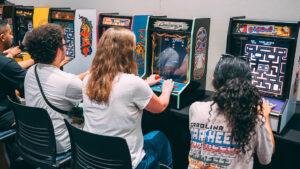
Educators may find it difficult to implement games because, unlike books or movies, they require hardware and skill to complete the story. Coturri Sorenson, the assistant director of UNCG’s Writing Center, put together two endeavors to help clear those hurdles.
The first will be spearheaded by Benjamin, who is studying the impact of tabletop role-playing gaming (RPG) on young people – how it informs their face-to-face interactions, and how they use it to explore ideas such as hierarchy, cooperation, conquest, and egalitarianism. They’ll apply for a grant with the Spencer Foundation to use his research to create an English course that incorporates gaming.
The second proposal would collect class curriculums involving video games. Coturri Sorenson is applying for a grant with the National Endowment for the Humanities Digital Projects for the Public to host an archive of video game-related syllabi for the academic journal “gamevironments.”
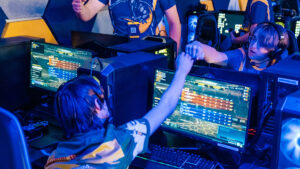
Coturri Sorenson, who uses the game “Stardew Valley” in her class about environmentalism in media, says a database would show educators how their peers have successfully taught with video games. It would extend opportunities like the ones the NCSV has created to other schools. “Here on campus, we’re lucky there are several professors who have spent years figuring out how to bring video games into the classroom,” she says.
Thanks to the seed grant, Benjamin has also gotten to know other students and faculty who share his love of gaming. “I wasn’t aware that so many people were also interested in doing similar work,” he says. “I felt for a while that I was the ‘game studies person,’ that nobody else was thinking about gaming. It’s been nice to see how much interest there is.”
Story by Janet Imrick, University Communications
Photography by Sean Norona, Jenn M. Smith, and Martin W. Kane, University Communications
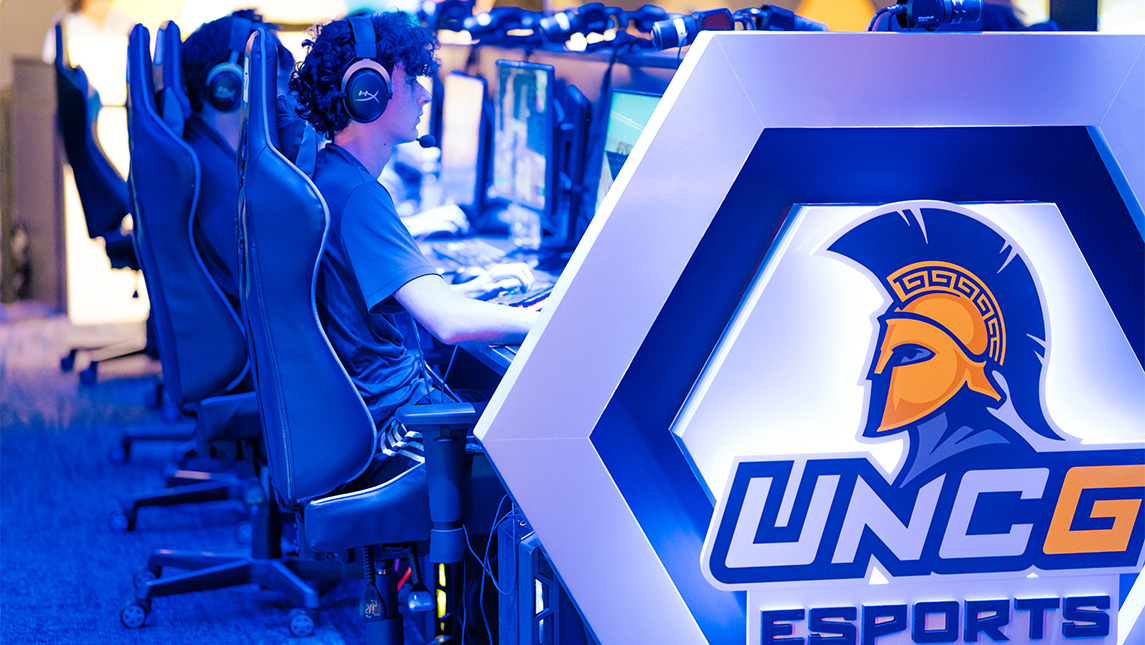
Pick the perfect platform.
